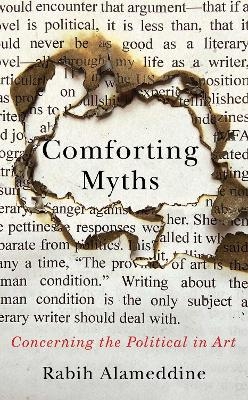
Comforting Myths
Concerning the Political in Art
Seiten
2024
University of Virginia Press (Verlag)
978-0-8139-5251-2 (ISBN)
University of Virginia Press (Verlag)
978-0-8139-5251-2 (ISBN)
In this book, Rabih Alameddine takes the subject of politics and art head-on, questioning the very premise of dividing these two pillars of culture into an either/or proposition. He reveals how a political dimension enlarges a work of art rather than making it less beautiful or reducing it to a polemic, as we are so often and carelessly taught.
A timely and urgent inquiry by one of global literature's leading lights
In this concisely argued and illuminating book, the PEN/Faulkner Award–winning author Rabih Alameddine takes the subject of politics and art head-on, questioning the very premise of dividing these two pillars of culture into an either/or proposition. He reveals how a political dimension enlarges a work of art rather than making it less beautiful or reducing it to a polemic, as we are so often and carelessly taught. But he also ponders what makes art political to begin with: how essential is the artist’s conscious political intent, and what does the reader or viewer contribute to the work’s political capability or significance? In exploring these questions, Alameddine engages intensely with his role as an immigrant and a gay author writing inside a globally dominant, often oblivious culture, and invokes the work of numerous writers, from Tayeb Salih and Aleksandar Hemon to Teju Cole and Salman Rushdie, who also struggle to be heard as something more than an “other.” The book features throughout Alameddine’s brilliantly relatable voice—shrewd, humorous, challenging, and as honest about his own limitations as he is about his passions.
A timely and urgent inquiry by one of global literature's leading lights
In this concisely argued and illuminating book, the PEN/Faulkner Award–winning author Rabih Alameddine takes the subject of politics and art head-on, questioning the very premise of dividing these two pillars of culture into an either/or proposition. He reveals how a political dimension enlarges a work of art rather than making it less beautiful or reducing it to a polemic, as we are so often and carelessly taught. But he also ponders what makes art political to begin with: how essential is the artist’s conscious political intent, and what does the reader or viewer contribute to the work’s political capability or significance? In exploring these questions, Alameddine engages intensely with his role as an immigrant and a gay author writing inside a globally dominant, often oblivious culture, and invokes the work of numerous writers, from Tayeb Salih and Aleksandar Hemon to Teju Cole and Salman Rushdie, who also struggle to be heard as something more than an “other.” The book features throughout Alameddine’s brilliantly relatable voice—shrewd, humorous, challenging, and as honest about his own limitations as he is about his passions.
Rabih Alameddine is an award-winning fiction writer and Chair of the Lannan Center for Poetics and Social Practice at Georgetown University. His most recent novel is The Wrong End of the Telescope.
| Erscheinungsdatum | 02.10.2024 |
|---|---|
| Reihe/Serie | Kapnick Foundation Distinguished Writer-in-Residence Lectures |
| Verlagsort | Charlottesville |
| Sprache | englisch |
| Maße | 127 x 203 mm |
| Themenwelt | Geisteswissenschaften ► Sprach- / Literaturwissenschaft ► Anglistik / Amerikanistik |
| Geisteswissenschaften ► Sprach- / Literaturwissenschaft ► Literaturwissenschaft | |
| ISBN-10 | 0-8139-5251-4 / 0813952514 |
| ISBN-13 | 978-0-8139-5251-2 / 9780813952512 |
| Zustand | Neuware |
| Haben Sie eine Frage zum Produkt? |
Mehr entdecken
aus dem Bereich
aus dem Bereich
Poetik eines sozialen Urteils
Buch | Hardcover (2023)
De Gruyter (Verlag)
CHF 83,90
Buch | Softcover (2024)
belleville (Verlag)
CHF 27,95


